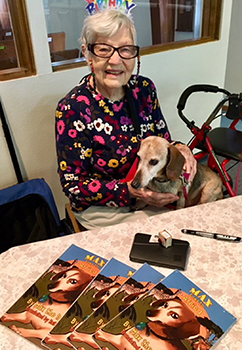| Search PNC News for stories of people and churches in our UCC Conference: |
|---|
Newport woman, 91, writes book on dog’s trip to Africa
From May to September 2016, Ruth Calkins of Newport UCC took her 14-year-old dachshund, Max, with her to Malawi for an adventure and humanitarian work with World Medical Fund.
 |
Ruth Calkins sits with Max and displays her book. |
From her 2016 trip, Ruth, who is 91, wrote an illustrated children’s book, Max Goes to Africa and published it in April.
It was her third trip to Africa. With her first husband’s agricultural work with USAID they spent 10 years in Africa. After he died in 1974, she remarried Don Calkins. In 2002, they moved to Newport to be near grandchildren.
After the AIDS crisis hit and she opened a website to educate people on it. Through that in 2004, she met Michael Burt, who founded World Medical Fund (WMF) in 1997, retiring early from British Health Services to start WMF to reach children in remote areas of Africa with few medical resources.
To save administrative costs, he and the treasurer worked from their homes. Soon Ruth’s Newport home was the office for WMF-USA.
WMF then used three Land Rovers as mobile children’s clinics to take medical officers to poor villages to give medical treatments, provide antiretrovirals to children born with AIDS and address malnutrition. They usually saw 150 sick children, brought by their mothers who walked for miles. WMF trained volunteer health workers and gave out mosquito nets. They educated girls to discourage early sexual activity as a way to prevent AIDS.
The WMF served several rural clinics each week. Six nurses from Australia helped. Where they went the HIV rate dropped from 16 to two percent, Ruth said.
In 2016, Ruth went to a village where 10 women in their 20s came to learn to sew on treadle machines and do crafts.
She traveled with sewing machines and suitcases full of craft supplies, so women could make quilts, tote bags, necklaces, earrings and crafts to sell to benefit the villages.
“The women learned quickly. A seamstress showed them how to use the machines,” said Ruth, who left her laptop there so they could continue a website to sell the items. The project ended when the seamstress wanted a raise WMF could not afford. WMF closed the project but left the machines so teenage girls and women continue to learn how to sew.
“I will always remember the women and how eager they were to learn,” she said.
“Carri, the woman who came with me for the first month, couldn’t stay longer. I don’t know how I would have managed without her, because I used a walker in our house and a cane outside,” said Ruth.
She stayed at the WMF’s concrete guest house with rattan chairs and settees, no table or chairs in the dining room, a small freezer, small electric stove and a sink-board for workspace. There was no water in the bathroom or kitchen. Three trash cans were filled at a faucet in the compound.
They dug a well, which they finished a few days after Carri left. While she was with Ruth, they had electricity most of the time, but after she left, there was only electricity during the day. After a month, the phone service and the laptop were up and running. It went off about seven each evening and the internet was spotty.
Evenings Ruth sat beside Max on a settee and sang to him.
“In the dark, there was little else to do. I had a flashlight and kept on my walker handy,” she said.
There she wrote the first two lines of Max Goes to Africa: “It’s almost bedtime. It’s time to relax. I’m just a small dachshund, and my name is Max.”
“I couldn’t think of any other rhymes then, but found it easy to complete when I returned home,” said Ruth, who published the book in January.
In rhyming couplets, the book tells of their adventure on the trip, complete with the plane ride, a long car ride to the village, and the people and strange animals they met.
At the end of the summer, Ruth’s three daughters and granddaughter came to Malawi. While they went on safari, Max stayed at WMF with Leah, a young woman who had helped Ruth around the house.
Since then, Ruth’s eyes have deteriorated with macular degeneration.
Although she has given up involvement with WMF, her oldest daughter now runs World Medical Fund USA from her home in California. It is now sponsoring higher education for young girls.
Ruth continues to write books about Max, including one she just published on Max Visits Santa Claus. Both are available on Amazon. She is having a book signing for another book, The Duck Who Loved a Goose, at 11, Saturday, Oct. 27, at Barnes and Noble in Spokane’s Northtown Mall.
For information, call 509-447-5957 or email drcalk@gmail.com.
Copyright © September 2018
